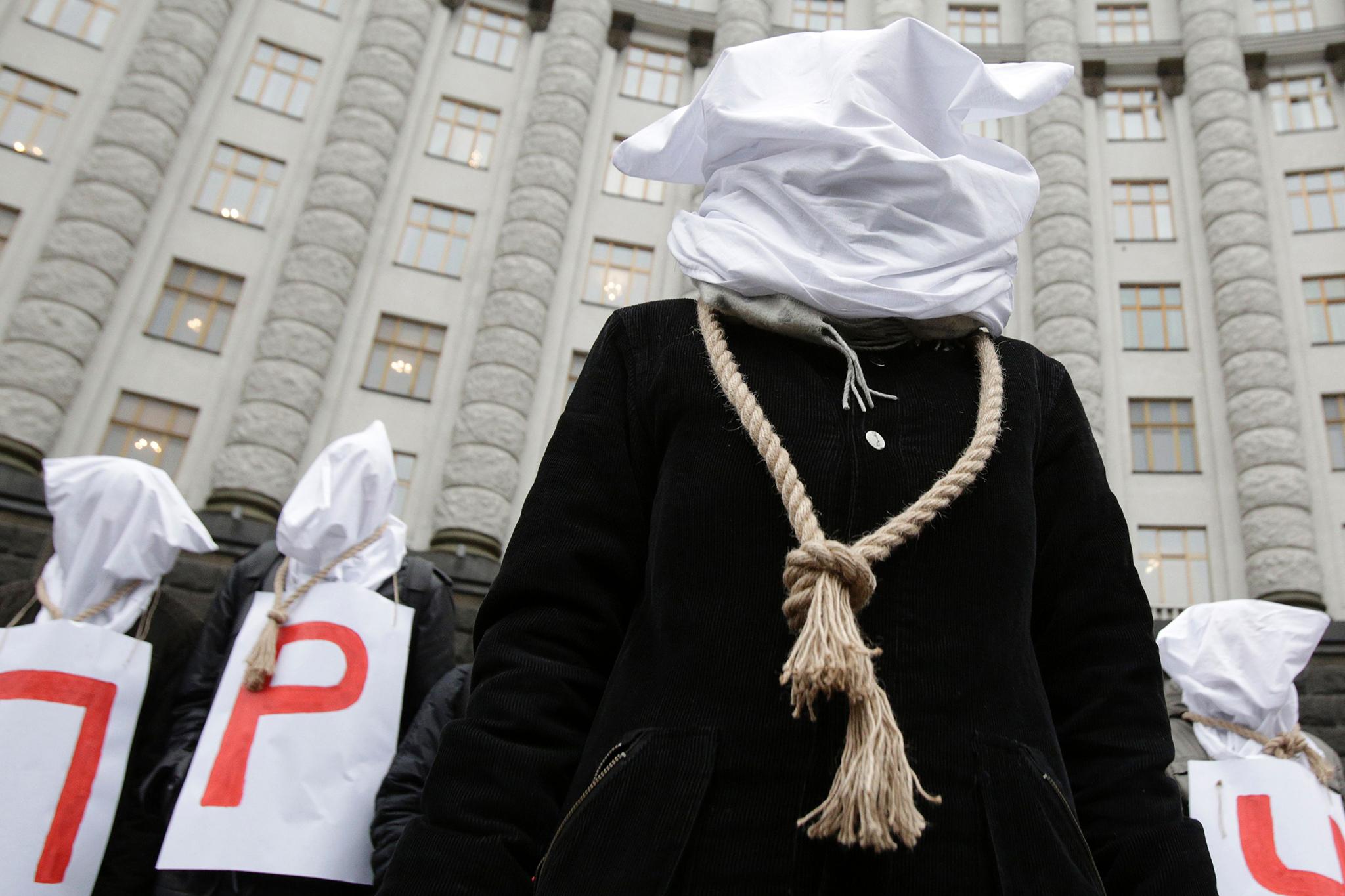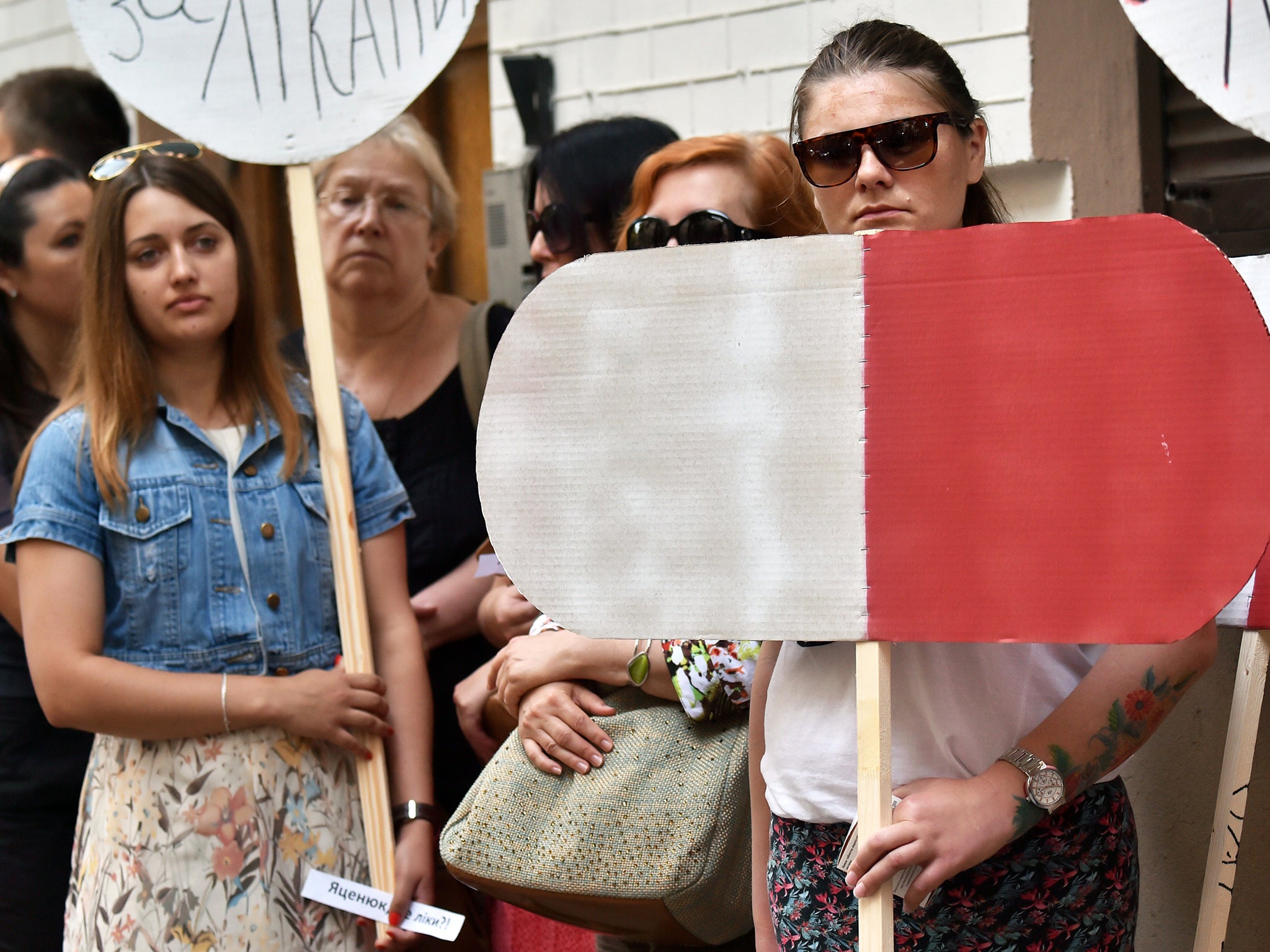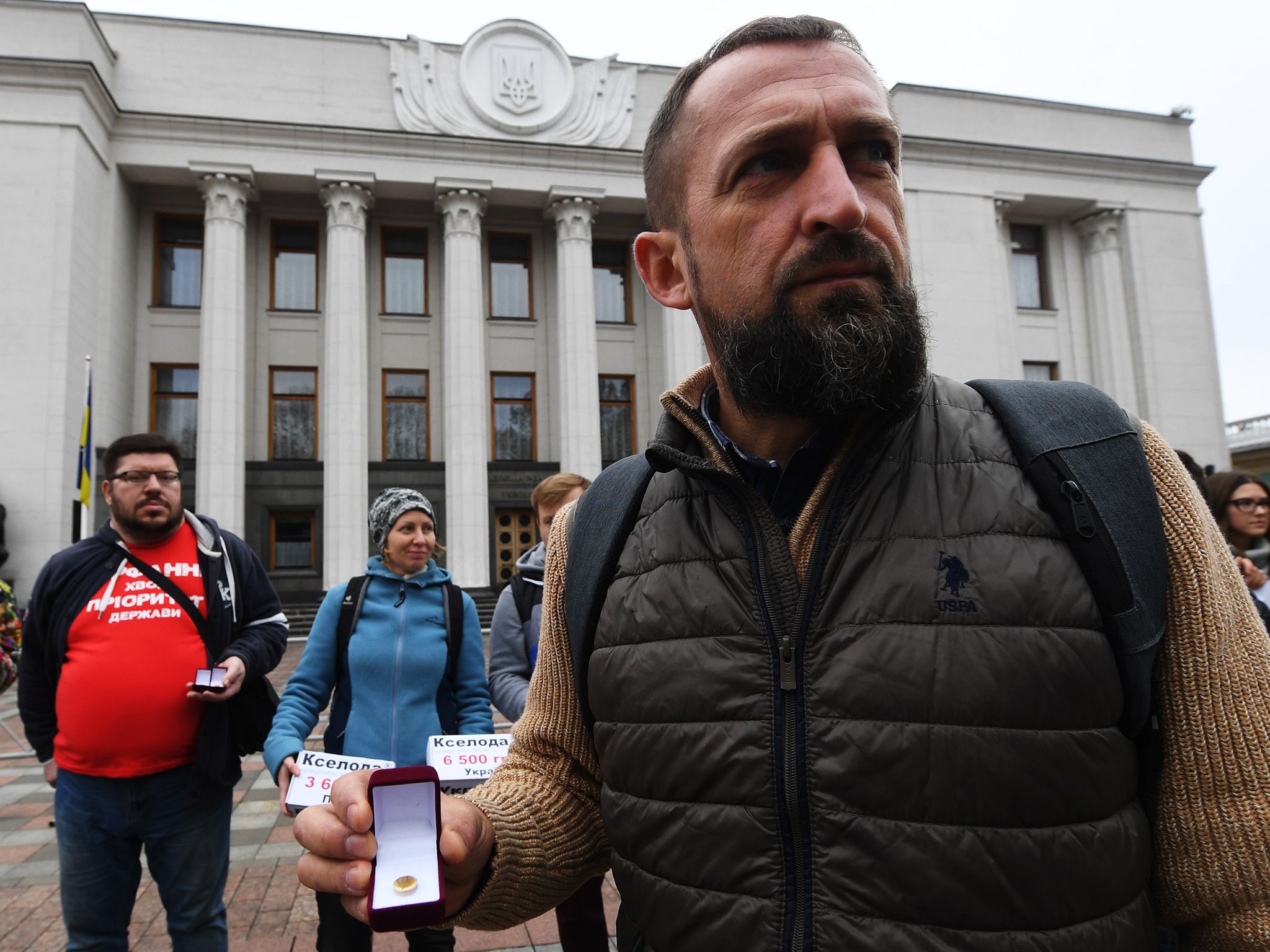Aids activists lead the fight against corruption across eastern Europe
The people of Ukraine can’t wait for health reforms – they are dying. Borzou Daragahi talks to the people who are weeding out corruption and changing the way medicine is managed


Dmytro Sherembei was told he would soon die. He was HIV positive. And his lungs were perforated. The 22-year-old was lying on a bed in an isolation ward of a Kiev hospital. The doctor gave him perhaps two more months to live. He found himself caught in a trap with no way out but to fight.
More than 20 years later, Sherembei is very much alive. He is a force of nature as he hustles around the Kiev headquarters of 100 Percent Life, the healthcare advocacy group he co-founded. The organisation boasts a sparkling and well-equipped clinic inaugurated in 2018 with the blessing of Sir Elton John, scores of full-time employees sprawled across a complex near the Podil district of the Ukrainian capital, as well as a nationwide network of 16,000 activists.
He and a cadre of other Aids and healthcare advocates have used dramatic protests such as carrying coffins or giant tablets into the streets in front of parliament to demand reform of the country’s corruption-riddled healthcare system. The doctor that gave him the death sentence? Sherembei’s group now advises him on patient care.
“It’s quite simple,” says Sherembei, now a father of two children. “The people living with HIV got united and started to fight for access to medicine.”
At a time when the administration of Donald Trump claims to have addressed corruption in eastern Europe by pressuring leaders over the phone or in backroom discussions, Sherembei and others’ garrulous, high-profile approach to fighting graft and patronage provides a grassroots counter-model. “There is a need for a political will,” says Lilia Carasciuc, Moldova director of Transparency International, the anti-corruption watchdog. “But the pressure comes from civil society.”

Across eastern Europe, they have created a vision for healthcare advocacy that goes well beyond HIV treatment for the estimated 200,000 to 240,000 patients with the virus in Ukraine. Lowering drug prices by cutting out corruption and middlemen has decreased overall costs for healthcare. Noisy activism has spurred patients rights campaigners and politicians pushing reform of primary health care, and pressing for deeper improvements to medicine in a region that has been suffering from immigration of doctors, graft, and deteriorating medical infrastructure.
Their work is being replicated not only in Ukraine but across eastern Europe, the Balkans and Central Asia, and provides a potential model for reforming health care across the world. Moldova, Bosnia and Herzegovina, Kazakhstan, Turkmenistan and Uzbekistan have sought to stamp out corruption in healthcare using the same methods.
“Aids activists were at the forefront because if HIV isn’t treated they will die,”says Evghenii Alexandrovici Goloşceapov, a healthcare rights advocate for the group Positive Initiative in Moldova. “They started by collecting information,” he says. “Then they started getting funds, and started taking up cases and advocating, first through traditional human rights organisations, then little by little creating their own groups, pushing for different creative campaigns.”

Inna Ivanenko uses a pad and paper to sketch how corruption used to work in the purchase of medicine in Ukraine. The executive director of Patients of Ukraine, an advocacy group supported by the UN, EU and Usaid, draws a map to show the countries where the drugs are produced, in places such as India or Switzerland.
At first they’re priced reasonably. But as she traces the path of the medicine through shell companies owned by or loyal to politically connected Ukrainian oligarchs, the prices balloon. By the time they make their way into the country through rigged bidding at markups that were up to 1,000 per cent of the market price.

“We had a very drastic situation,” says Ivanenko. “Because 40 per cent of the money was laundered. It was just overspent and stolen due to different corrupt schemes which were taking place in the ministry of health.”
Healthcare in eastern Europe has been riddled with problems since the collapse of the Soviet Union. In Moldova a single oligarch long dominated the pharmaceuticals importation business. In Ukraine, procuring drugs was divided up among five powerful bosses. Patients were dying. Sherembei recalled the case of a friend, Mikhail, who contracted HIV.
“He started finally to take the medicine, but it had to be smuggled into the country,” he said. He didn’t make it. He died in 2004 at the age of 28, leaving behind a daughter.
Patients suffering from illnesses were often forced to borrow from relatives, sell their cars or homes to afford healthcare
Those with rare diseases were unable to obtain crucial medication for more than a few months a year; neither they nor the state could afford it. Patients suffering from illnesses were often forced to borrow from relatives, sell their cars or homes to afford healthcare. According to a survey published in 2016, only a third of patients contracting an illness would opt to see a doctor, citing the high costs of treatment.
International officials say that after justice reform, improving healthcare is one of the most difficult and puzzling. As the United States has discovered, the large amounts of money involved as well as the huge interests of pharmaceutical firms, patients and medical workers make it enormously difficult to bring about change in healthcare.
“It relates to vested interests, corruption, weak and opaque institutions, lack of awareness about the impact of unreformed healthcare system on human lives and human rights,” says Dafina Gercheva, head of the United Nations Development Programme in Ukraine.
Ukraine’s 2014 Maidan uprising against the country’s entrenched post-Soviet ruling class has had mixed political results, but it created an opening to dislodge some of the graft that had infected the healthcare system. In 2015, activists pushed the government to hand the entire process of procurement to neutral international entities, including UNDP, Unicef for vaccines and UK-based Crown Agents.

The results were startling. The shift of the health ministry saved tens of millions of dollars, allowing Ukraine to purchase triple the amount of life-saving medicines it was obtaining beforehand. Instead of grappling for scraps, the programme to purchase Aids medicines wound up with a small surplus.
The change transformed the lives of those not just with HIV but with other rare illnesses such as Dima Kulesha, a 22-year-old with the debilitating genetic disease Mucopolysaccharidosis, which has stunted his growth and caused him great pain.
For years, he was unable to ride a bicycle or even walk some days. A pair of expensive medicines are the only treatments, but because of budget constraints he only had access to it for a few months a year. After ferreting out corruption in healthcare, Kulesha is able to take the medicine all year. He’s studying management at the Kiev National Institute of Architecture and Design. “If I don’t have the medicine, I will get worse month after month until I die,” he says during an interview in the office of his mother, Tatyana Kulesha, a healthcare activist and schoolteacher.
There have been other major reforms. Allocations to hospitals are now based on the number of patients instead of beds, a major change that rewards medical facilities that keep Ukrainians healthy and happy rather than large hospitals.
Allocations to hospitals are now based on the number of patients instead of beds, a major change that rewards medical facilities that keep Ukrainians healthy and happy rather than large hospitals
“Both private and public hospitals compete with each other, to draw patients and money,” says Ivanenko. “We see light at the end of the tunnel where patients will have a choice for care.”
Salaries of doctors were increased to keep them from migrating abroad or demanding side payments from patients to get preferential treatment, a common practice throughout healthcare systems in eastern Europe. But the success in cutting out corruption also created a lot of enmity among the networks of interests, who are struggling to regain control of the lucrative system for buying and selling drugs.
“Are there people who want to bring back the old ways?” says Sherembei. “The answer will definitely be yes.”
In a surprise election last year, comedian Volodymyr Oleksandrovych Zelensky was elected president of Ukraine on a platform of ferreting out corruption. But in the disarray that came with the change of government the oligarchs saw an opportunity to regain their advantages.
They pushed for a new law that would hand procurement of medicine back to the central government. The draft was introduced to the newly elected parliament in late 2019. While most healthcare reform advocates agree that the Ukrainian government should eventually take over the purchase of medicine, they have insisted the transition be gradual lest it jeopardise any gains.
“In a society where there is a marriage between business and politics, the lack of transparency and integrity results in distrust and a deep sense of insecurity,” says Gercheva, of UNDP.
In a society where there is a marriage between business and politics, the lack of transparency and integrity results in distrust and a deep sense of insecurity
Throughout the autumn panicked activists and patients mobilised, and strategised. “Healthcare is one sphere where we feel we are starting to understand how things are operating and are making a difference,” says Ivanenko. “But we’re very afraid of revenge.”
For several years, there had been a campaign against the reforms, with politicians arguing that the international organisations were purchasing inferior generic drugs, even pumping out fake news stories alleging that a child had died because of a bad dose of polio vaccine.
“Losing excessive profits due to the new rules of procurement by international organisations, led the people who were making a fortune out of them to start a real information war against international organisations,” said a report prepared by the International Renaissance Foundation, a Ukrainian organisation funded by the Open Society Institute.

During visits to offices of healthcare activists and advocates in Kiev, during the weeks before the vote, the anxiety was palpable. Many feared that the hard-won gains secured over the years by staging die-ins and holding rallies were about to be lost. Patient advocates demanded a meeting with lawmakers, and managed to present the case that Ukraine was not ready to hand off a function as important as the purchase of medicine from neutral international bodies that charge small transparent management fees to government officials who have a track record of pilfering billions.
They argued that the electronic procurement system the Ukrainian government uses lacks the capacity to deal with the huge sums and the often rapid needs of medical procurement. The activists won, managing to convince parliament to hold off on any changes for now.
But the experience gave healthcare activists an important lesson. Simply changing the system wasn’t enough; they had to stay ever vigilant, lest the old guard claws back its privileges. In Moldova, for example a Dubai-based business allegedly linked to the exiled oligarch who long dominated the economy managed to secure a 50-year contract to maintain a monopoly on providing dialysis services to diabetes patients, says Carasciuc, of Transparency International.
Fueling the determination of those fighting for healthcare reform is the anguished memory of those who weren’t strong or lucky enough to survive. Ruslan Poverga, a Modovan healthcare rights activist for the group Positive Initiative, recalled how a friend, Igor, spent the last few years of his life scrambling for money to treat his Hepatitis C with medicines that ultimately failed to work. His liver finally gave out a little more than three years ago, and he died in his early forties, leaving behind two children whose mother had already perished in a car crash.
“When the reform happened it was too late for him,” says Poverga, who also suffers from Hepatitis C. “There are reforms that are happening but slowly, and we need to speed them up. The price we pay for slow reforms is our lives. We don’t have the luxury to wait.’’
Join our commenting forum
Join thought-provoking conversations, follow other Independent readers and see their replies
Comments
Bookmark popover
Removed from bookmarks